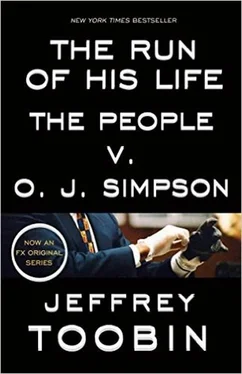Cochran replied with great indignation. “There seems to be this great fear of the truth in this case,” he said. “This is still America. And we can talk. We can speak. Nobody can stop us.” (A rather odd complaint on behalf of a client who had already written a bestselling book from jail.) Ito caved, and Simpson rose to deliver a sound bite for the evening news.
“Good morning, Your Honor,” he said. “As much as I would like to address some of the misrepresentations made about myself and Nicole concerning our life together, I’m mindful of the mood and the stamina of this jury. I have confidence, a lot more it seems than Ms. Clark has, of their integrity, and that they’ll find-as the record stands now-that I did not, would not, and could not have committed this crime. I have four kids-two kids I haven’t seen in a year. They asked me every week, ‘Dad, how much longer?’ ”
This was more than even Ito could take, and he cut Simpson off with a curt, “All right.”
Simpson said, “I want this trial over.”
Even this brief monologue offered a useful insight into Simpson’s character. Throughout the trial, his obsession remained the “misrepresentations” about his relationship with Nicole, especially the notion that he was imploring Nicole to come back to him. Typically, too, he attributed his decision not to testify to the “mood and stamina” of the jury, when the real reason had more to do with his lead lawyers’ belief in his guilt. The statement was, in short, another snapshot of Simpson’s narcissism.

Tuesday, September 26, 1995, broke chilly and drizzly. During the fall and winter of the previous year, Southern California had been afflicted with some of the coldest and wettest weather in recent history. A normal spring and summer, hot and dry, had followed. Now, on the day that summations were to begin, it appeared that the seasons had changed once more. Jury selection had commenced 365 days earlier. The trial of O.J. Simpson had taken one year.
Even before she uttered her first words to the jury, Marcia Clark was exhausted, with large half moons of purple under each eye. She looked emaciated beneath her simple beige jacket. The chicken salads delivered to her office every lunch hour had often gone untouched. Not so her silver cigarette lighter, the one inscribed with the words TRUTH AND JUSTICE. For all these months, she had fueled herself with an unending relay of Dunhills.
First, Clark thanked the jury, which was customary but not, for her, heartfelt. She and her colleagues had traveled a long way since the optimistic close to jury selection. Over the course of the trial, Clark had felt no warmth from this group, no sympathy for the victims, no core of emotional revulsion at the murders. Clark’s instincts about juries had not entirely deserted her, even if enlightenment came far too late. She had come to see that these were fearful jurors, more concerned about the reaction to their verdict than about reaching the right one. They took few notes; they never smiled or frowned; they gave no sense of themselves away-they were too frightened to reveal anything. As the race issue took over the case, the prosecutors knew above all that they needed a courageous jury, and they sensed-correctly, as it turned out-that they didn’t have one.
Clark’s first words about the facts of the case included a revealing slip of the tongue. “Let me come back to Mark Fuhrman for a minute,” she said. Actually, she had not mentioned him before, so she was not really coming “back” to him. It just seemed that way, for the defense had succeeded so completely in making Fuhrman the center of this case. Like it or not, everyone in this trial was always coming back to Mark Fuhrman.
“Did he lie when he testified here in this courtroom saying that he did not use racial epithets in the last ten years?” Clark continued. “Yes. Is he a racist? Yes. Is he the worst LAPD has to offer? Yes. Do we wish that this person was never hired by LAPD? Yes. Should LAPD have ever hired him? No. In fact, do we wish there were no such person on the planet? Yes.
“But the fact that Mark Fuhrman is a racist and lied about it on the witness stand does not mean that we haven’t proven the defendant guilty beyond a reasonable doubt, and it would be a tragedy if, with such overwhelming evidence, ladies and gentlemen, as we have presented to you, you found the defendant not guilty in spite of all that, because of the racist attitudes of one police officer.”
This immediate and categorical denunciation of Fuhrman was probably the best Clark could have done under the circumstances, but it also underlined how the racial issue paralyzed the prosecution. Yes, Fuhrman was racist, but Simpson was still guilty. The yes/but formulation represented the dominant motif of the summation that followed over the next five hours. Yes, the investigation had been imperfect; yes, the criminalists made mistakes-but the evidence led only to this defendant. Clark was rushed and a little scattered as she attempted to pull all the complex strands of evidence together, but still she delivered an adequate, professional summation-and a persuasive one for a jury willing to listen.
In one passage, Clark drew on the vast changes the trial had wrought in her own life. She thought the jurors might wonder just what Simpson had been doing in the narrow passageway behind Kaelin’s room, the place where he knocked into the air conditioner and dropped the glove. “You are thinking, why not drop it in a Dumpster on the way home?” she said. But Clark suggested that this wasn’t possible. “He can’t. He can’t, because he is famous. If someone sees him hanging around near a Dumpster on that night of all nights, they are going to recognize him, and he is going to have a witness.” Clark came up with this theory because now she, too, was noticed everywhere she went, and she believed that Simpson, who had far more experience in being famous, had even factored his celebrity into his plans for murder.

In her fury at Darden after the glove demonstration, Clark had decided for a while that she didn’t want him doing any part of the summations. She would do it all herself. But Clark’s anger cooled, and she ultimately ceded the domestic-violence portion of the case to him. Ito had decreed that there would be evening sessions during closing statements, so Darden rose to address the jury at shortly after seven in the evening.
Television, of course, was sending the proceedings around the world, but this first nighttime session of the case gave the courtroom a curious intimacy. We were, after all, nearly the only people in that vast and sterile building, and the uniqueness of the experience gave the room a strange glow. Chris Darden captured that mood and that moment. This case-chiefly Cochran’s race-baiting-had taken its toll on Darden. The public display of his shortcomings as a lawyer had pained him as well. Darden had a great deal of help with this summation; it was written chiefly by fellow prosecutor Scott Gordon and a private stalking and domestic-violence expert named Gavin de Becker. But just as Darden deserved the blame for his several failures in that courtroom, so too did he earn the credit for this triumph.
Darden used a perfect metaphor for the Simpson marriage: a burning fuse. He noted that the defense had argued that “just because” there was marital discord, “it doesn’t mean anything… Well, this isn’t a ‘just because’ issue. This is a ‘because’ issue. It is because he hit her in the past. And because he slapped her and threw her out of the house and kicked her and punched her and grabbed her around the neck… And it’s because he used a baseball bat to break the windshield of her Mercedes back in 1985. And it’s because he kicked her door down in 1993… It’s because of a letter he wrote her… June the sixth, talking about the IRS. It’s because he stalked her.” Darden then took each of these domestic-violence incidents in chronological order and punctuated them with the phrase “And the fuse is burning.” He played the pair of 911 calls-the wordless slaps from 1989, and the terrified “He’s going to kill me!” from four years later.
Читать дальше














